NOTE: I’m using the Japanese naming convention here, Surname first.
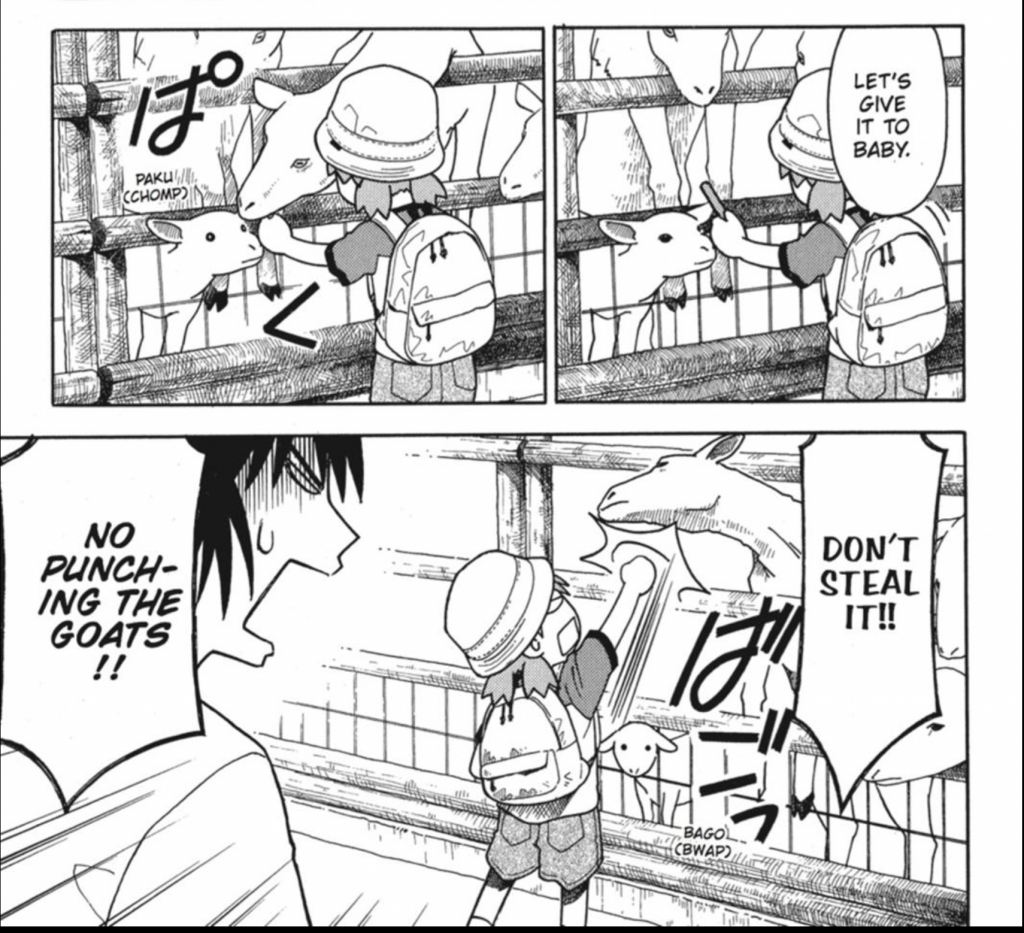
We easily forget what being a child is like. We retain the gist of it, sure, and we recall with crystalline clarity the moments that shaped us, but most of us don’t really remember the day-to-day.
Adults also have a tendency to dismiss the intense emotions they felt as children, or to feel faintly embarrassed by them. This makes writing about childhood a risky choice and doubly so if you want to portray a happy childhood. With Yotsuba &! mangaka Azuma Kiyohiko manages not only to create a happy childhood for his protagonist but to celebrate the everyday.
The premise of the series is simple: it’s about a bubbly, inquisitive five-year-old girl named Yotsuba and her daily adventures in the small Japanese town to which she’s recently moved. Yotsuba’s sunny disposition is her defining trait and Azuma makes it natural and endearing. This is not to suggest she is always chirpy – she has her bad days and her tantrums, too. However she’s doing on any given day, Azuma’s portrayal of her has an honesty to it, and the series is never saccharine.
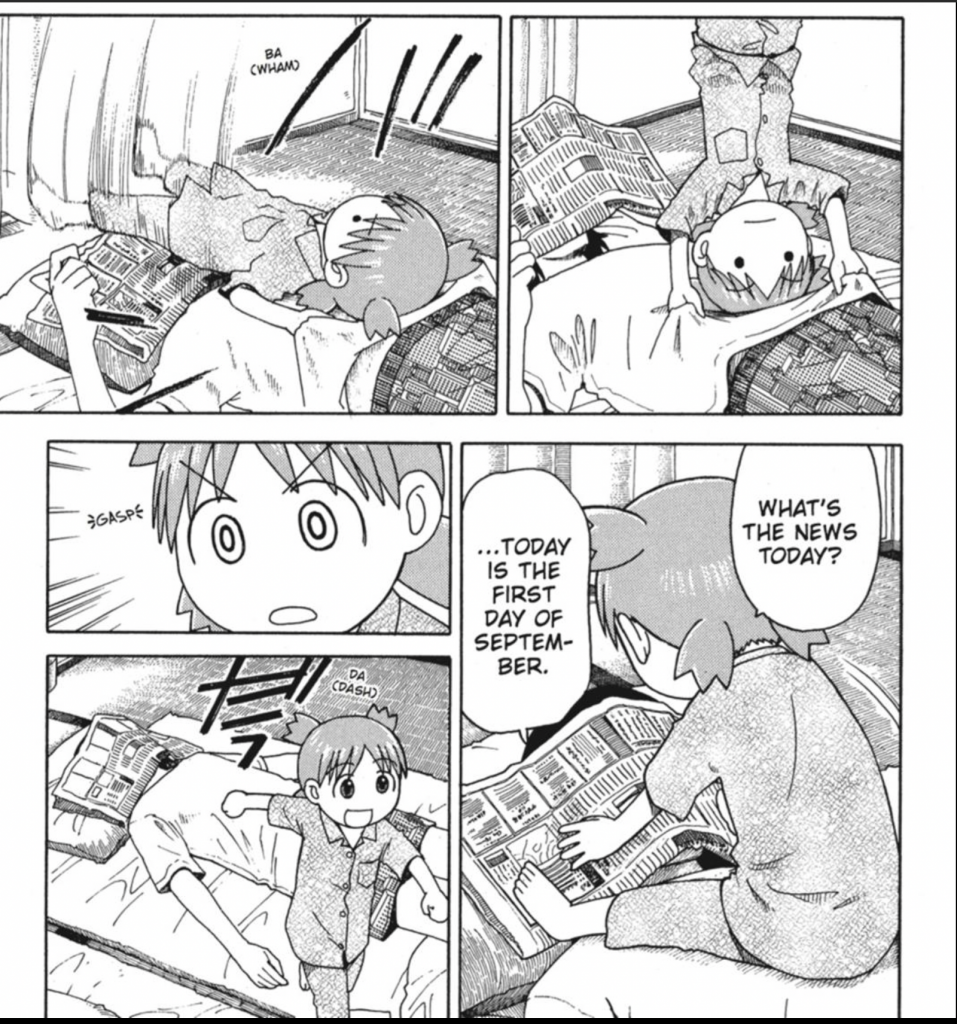
The title Yotsuba &! sets up one aspect of structure: it tells us each chapter will chronicle Yotsuba’s interaction –often her first interaction– with one specific thing: elephants; fevers; schedules; fishing; fireworks; typhoons and so on. The exclamation mark in the meantime, coupled with the cover visuals, suggests the tenor of the manga. Lots of emotion! Exciting stuff!
That said, Yotsuba &! is mostly a gentle, open-ended, slice-of-life comedy and Azuma keeps the narrative structure suitably loose. Most chapters, for example, do not close with a definitive end (nor a cliffhanger), just as each of our days doesn’t. Things trail off, drop to a simmer, or something distracts us. Sometimes episodes do wrap up neatly, as in the case when, inspired by a noir film her father and Jumbo are watching, Yotsuba storms her neighbours’ home. In revenge for an unspecified crime, she ‘interrogates’ and shoots each of them with her water pistol, only to be outmanoeuvred in the end by the family’s eldest child. In a goofy, roundabout way, Yotsuba learns that revenge is ultimately pointless and may well cost you your life (that, and always keep your water pistol full).
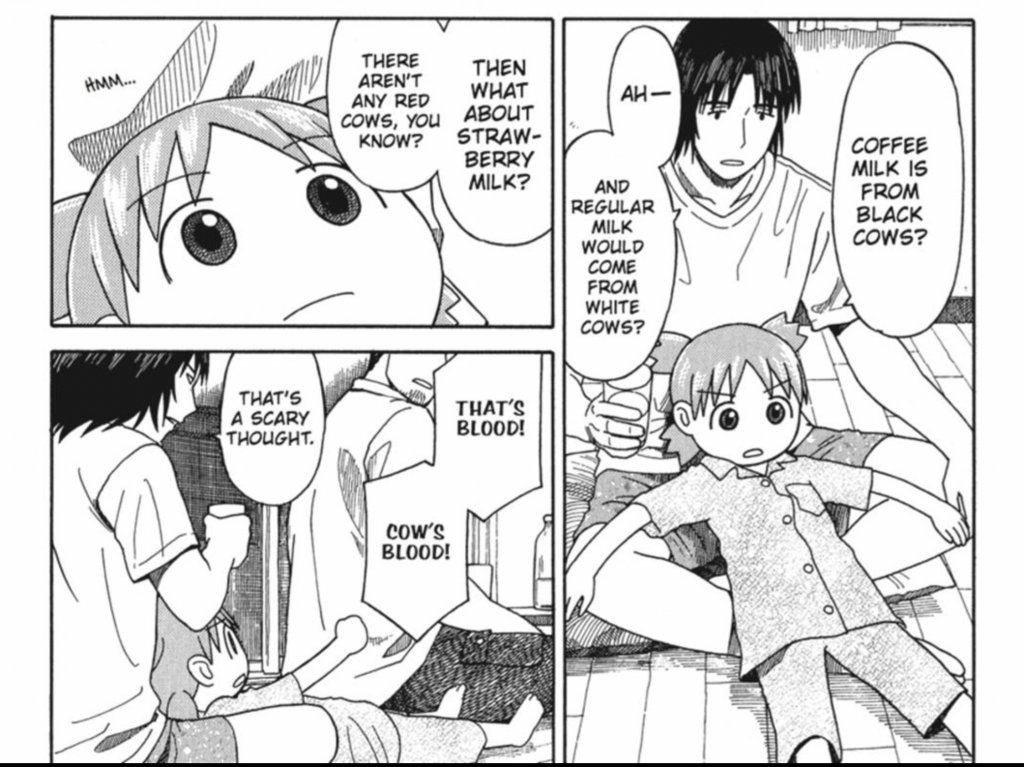
Azuma deploys a range of facial expressions to comedically (and efficiently) convey Yotsuba’s ever-changing state of mind. Her heightened, slightly unreal expressions, compared to the naturalistic expressions of the adults in her life, give us a great peek into her character and her rapid thought processes. Often, Azuma skillfully accomplishes this expressive depiction of thought in very few panels.
This approach to realism is postural, behavioural, and emotional, too. While she is undeniably the most cartoony in the way Azuma draws his characters, she also seems very much a real person. Grilling yakiniku for the first time and struggling to turn over a piece of meat, her face locked in concentration, her entire body tilts with the tongs, as she tries to master the move. Anyone with kids will tell you this moment is perfectly true – kids will unconsciously move their whole body in an effort to learn a movement requiring fine control of one part of the body (and gamers will recognise it in noobs who lean while turning their car). In another case, incensed that an adult goat has snatched a carrot she was offering a baby goat, she instinctively punches the elder goat for stealing.
***
Yotsuba &! unfolds in a little unnamed town a short distance from Tokyo. The world in which Yotsuba lives is another example of the real. While it may not be as near-obsessively realistic as Taniguchi Jiro’s work, Azuma’s town still feels utterly plausible and lived-in. His line work is beautifully controlled and he depicts the mundane with near-reverence. Some mangaka take a long time to settle into what becomes their ‘style’ but here again, Azuma is quick – by around volume three, his line work has stabilised, becoming lighter and more confident than when he began.
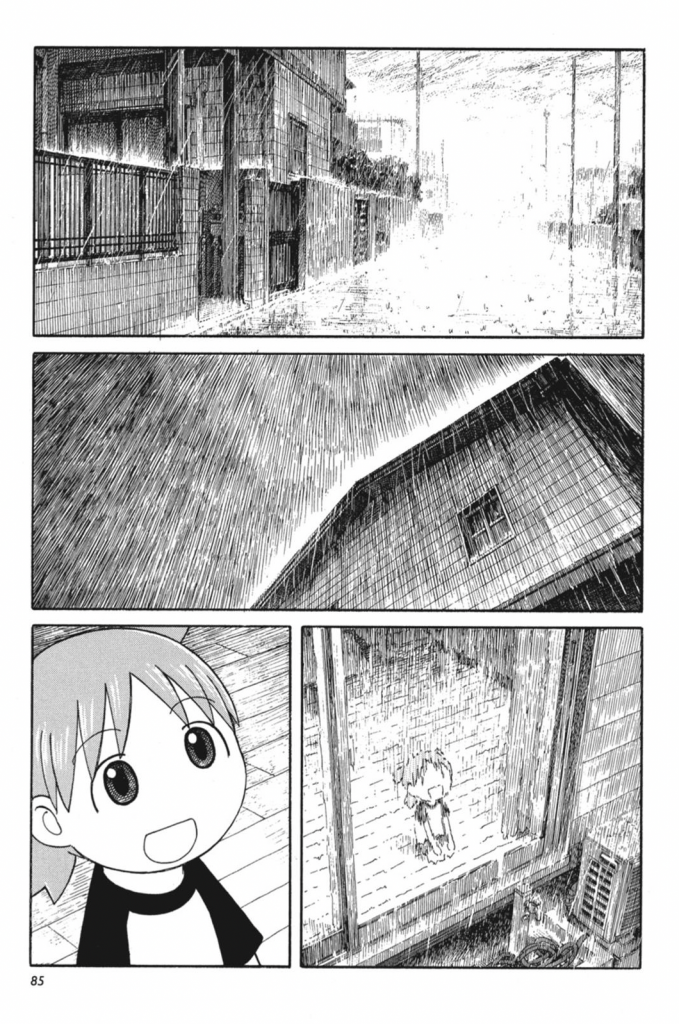
Each chapter takes place more or less on consecutive days. This is an essential aspect of the manga, as it helps the development of relationships, the passage of time, and the open-endedness of the events feel natural. Another important aspect is that we stay in this world at all times. Unlike in Watterson’s Calvin & Hobbes, for example, where we enter the imaginative worlds in Calvin’s mind, in Yotsuba &! we remain in the real world. The only exception is the vignette at the end of a chapter. These function as a sort of single-panel epilogue, and occasionally involve things as they may appear in the imagination of a five-year-old.
As a non-Japanese speaker, it’s hard to write about Azuma’s use of language, but the translators at Yen Press work hard to convey the unusual turns of phrase Yotsuba deploys; the amusing mistakes of a kid learning the finer points of syntax; her silly word games and jokes. There are helpful notes for unfamiliar terms as well as translations of sound effects.
Azuma trusts his readers to keep up and the main cast is introduced rapidly. First, we meet 5-year-old Koiwai Yotsuba and her adoptive father, Yо̄suke, a freelance translator who works from home. That and the fact that he has the temperament for it means he often pauses his work to join Yotsuba in her games when asked. He doesn’t make a big deal of it – we get the sense he gladly accepts it as part of his job as a dad.
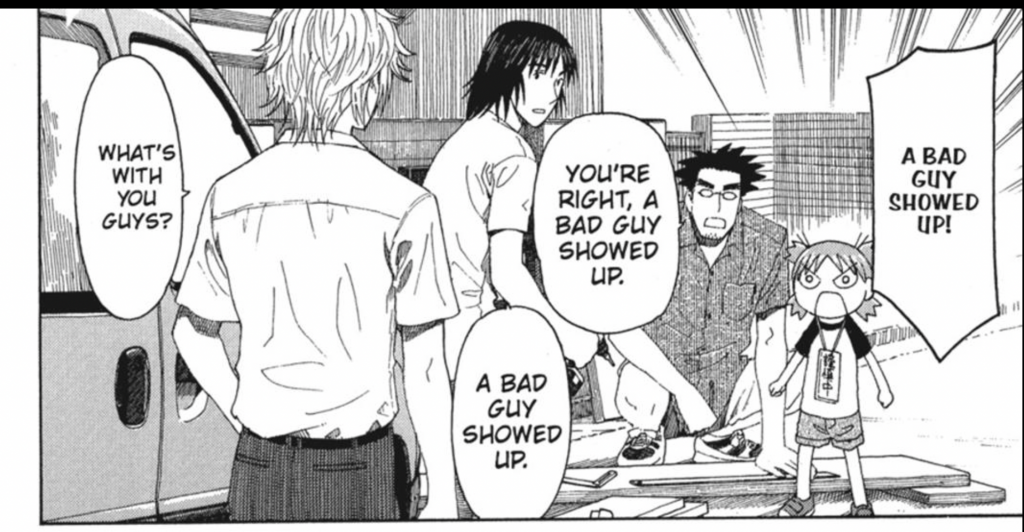
We then meet Yotsuba’s neighbours, the Ayase family, comprising the worldly-wise and mischievous mother, the kindly but busy father, the savvy eldest daughter, Asagi, the earnest and dreamy middle child, Fuuka, and the sweet, responsible youngest kid, Ena.
In these early chapters, we also meet Yо̄suke’s best friend, Jumbo. Jumbo is the proverbial gentle giant and his height is a running gag throughout the series. A second-generation flower seller, he runs a small shop and meets Yо̄suke and Yotsuba regularly. The relationship between him and Yо̄suke is warm and believable. When he takes to Yotsuba with great affection, effortlessly joining in her made-up games, you feel all is right in the world. This feeling is echoed in Yotsuba’s contacts with one-off characters, as the Asian tendency to have a high tolerance for rambunctious kids means that many of Yotusuba’s interactions with the wider world are charming, funny or kind.
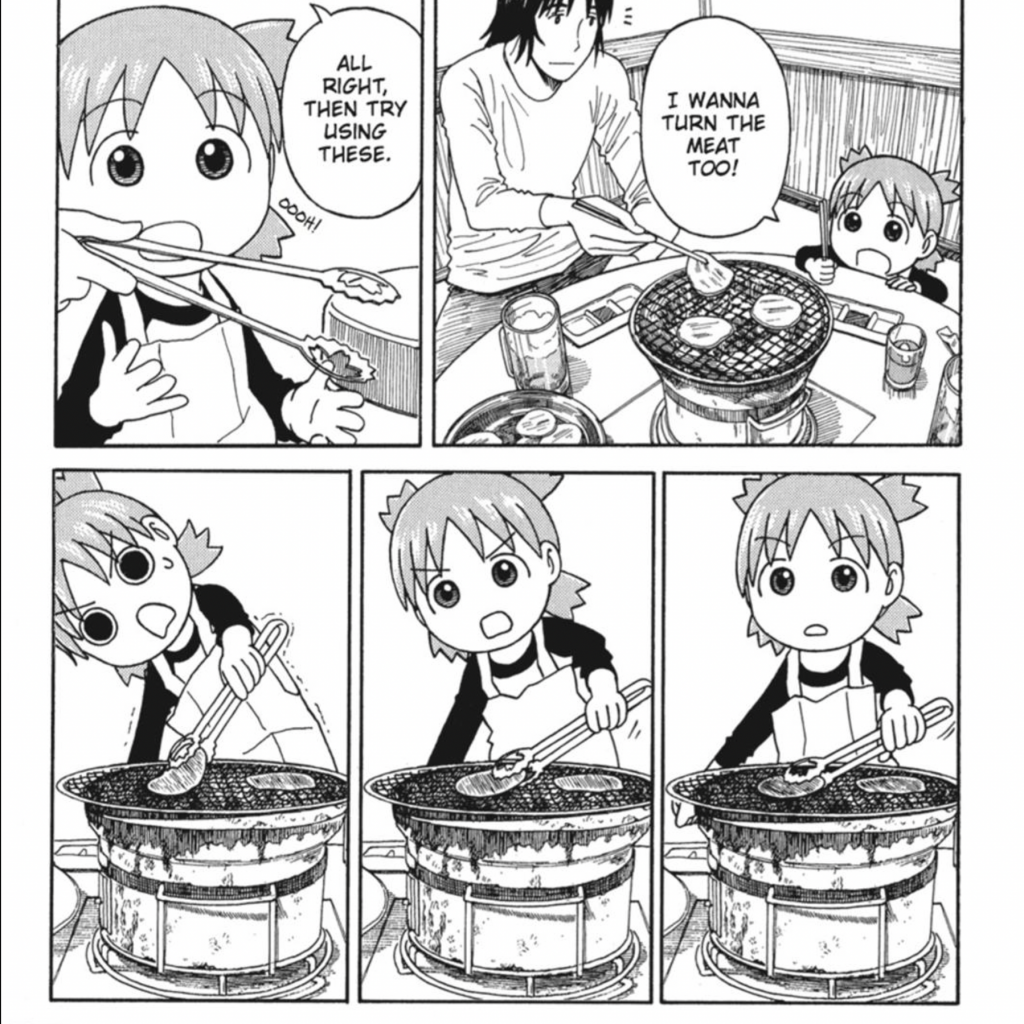
Much later, we meet another of Yо̄suke’s friends, Yanda. Yanda is an important character as he functions as Yotsuba’s main foil. Asagi and her friend Torako, as well as Ena’s friend Miura, play this role too, but Yanda resists Yotsuba’s charms much longer. As such, the Yanda-Yotsuba interactions are some of the funniest in the series.
***
Yotsuba &! is a rare beast because in fiction, happiness hardly sells. It’s encouraging that the series is popular, has been nominated for a number of awards over the years, and in 2016, won the coveted Grand Prize at the Tezuka Osamu Cultural Awards. It deserves a wider audience and certainly works hard to earn one. Try a volume or two of Yotsuba &!; dip into a sunny, funny childhood and revel in the joy of discovering the world afresh.
SOLRAD is made possible by the generous donations of readers like you. Support our Patreon campaign, or make a tax-deductible donation to our publisher, Fieldmouse Press, today.

Leave a Reply